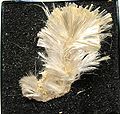Halotrichite
Appearance
| Halotrichite | |
|---|---|
 A sample of halotrichite | |
| General | |
| Category | Sulfate minerals |
| Formula (repeating unit) | FeAl2(SO4)4·22H2O |
| IMA symbol | Hth[1] |
| Strunz classification | 7.CB.85 |
| Crystal system | Monoclinic |
| Crystal class | Prismatic (2m) (same H-M symbol) |
| Space group | P21/c |
| Unit cell | a = 20.51, b = 24.29 c = 6.18 [Å]; |
| Identification | |
| Color | Colorless to white, yellowish, greenish |
| Crystal habit | Acicular to asbestiform clusters, incrustations and efflorescences |
| Cleavage | Poor on {010} |
| Fracture | Conchoidal |
| Tenacity | Brittle |
| Mohs scale hardness | 1.5–2 |
| Luster | Vitreous |
| Diaphaneity | Transparent, translucent |
| Specific gravity | 1.89 |
| Optical properties | Biaxial (−) |
| Refractive index | n |
| Birefringence | |
| 2V angle | Measured: 35° |
| Solubility | Soluble in water |
| Other characteristics | Astringent taste |
| References | [2][3][4] |
Halotrichite, also known as feather alum, is a highly hydrated sulfate of aluminium and iron. Its chemical formula is FeAl2(SO4)4·22H2O. It forms fibrous monoclinic crystals. The crystals are water-soluble.
It is formed by the weathering and decomposition of pyrite commonly near or in volcanic vents. The locations of natural occurrences include: the Atacama Desert, Chile; Dresden in Saxony, Germany; San Juan County, Utah; Iceland and Mont Saint-Hilaire, Canada.
The name is from Latin: halotrichum for salt hair which accurately describes the precipitate/evaporite mineral.[4]
- Gallery
-
Halotrichite from California
-
Halotrichite from the abandoned Golden Queen mine on Soledad Mountain south of Mojave, California
References
[edit]- ^ Warr, L.N. (2021). "IMA–CNMNC approved mineral symbols". Mineralogical Magazine. 85 (3): 291–320. Bibcode:2021MinM...85..291W. doi:10.1180/mgm.2021.43. S2CID 235729616.
- ^ Handbook of Mineralogy
- ^ Halotrichite on Mindat.org
- ^ a b Halotrichite data on Webmineral


